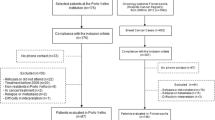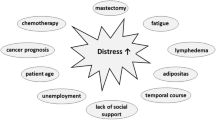Abstract
Background
The purpose of this study was to investigate the factors related to early postoperative psychological conditions in breast cancer patients with axillary lymph node dissection 3 months after the surgery.
Methods
The subjects of this study were 200 consecutive patients who underwent axillary lymph node dissection for breast cancer at our hospital. Age, body mass index, surgical side, work, marriage, presence of children, presence of co-resident household members, resection of the pectoralis minor muscle, preoperative chemotherapy, postoperative chemotherapy, postoperative hormonal therapy, postoperative radiotherapy, shoulder range of motion, upper limb function (Disabilities of the Arm, Shoulder and Hand; DASH), and psychological conditions were evaluated. In this study, a Distress and Impact Thermometer was used to classify patients with adjustment disorders, depression, or major depression and suicidal ideation into a group with psychological problems and the remaining patients into a group with no psychological problems.
Results
Logistic regression analysis showed that only DASH was statistically significantly associated with psychological conditions (p < 0.05). Using receiver operating characteristic curve analysis, a DASH score of 18 or greater was found to be very specific for predicting psychological conditions.
Conclusions
The observation that somatic symptoms and disability of upper limb function are related to psychological conditions may indicate the importance of postoperative rehabilitation in breast cancer patients with axillary lymph node dissection.

Similar content being viewed by others
References
Jemal A, Siegel R, Ward E, Hao Y, Xu J, Murray T, et al. Cancer statistics. CA Cancer J Clin. 2008;58:71–96.
Snell L, McCarthy C, Klassen A, Cano S, Rubin L, Hurley K, et al. Clarifying the expectations of patients undergoing implant breast reconstruction: a qualitative study. Plast Reconstr Surg. 2010;126:1825–30.
Derogatis LR. The prevalence of psychiatric disorders among cancer patients. JAMA. 1983;249:751–7.
Hotopf M, Chidgey J, Addington-Hall J, Ly KL. Depression in advanced disease: a systematic review. Part 1. Prevalence and case finding. Palliat Med. 2002;16:81–97.
Minagawa H, Uchitomi Y, Yamawaki S, Ishitani K. Psychiatric morbidity in terminally ill cancer patients. A prospective study. Cancer. 1996;78:1131–7.
Okamura H, Watanabe T, Narabayashi M, Katsumata N, Ando M, Adachi I, et al. Psychological distress following first recurrence of disease in patients with breast cancer: prevalence and risk factors. Breast Cancer Res Treat. 2000;61:131–7.
Akechi T, Okamura H, Nishiwaki Y, Uchitomi Y. Psychiatric disorders and associated and predictive factors in patients with unresectable nonsmall cell lung carcinoma: a longitudinal study. Cancer. 2001;92:2609–22.
Zabora J, BrintzenhofeSzoc K, Curbow B, Hooker C, Piantadosi S. The prevalence of psychological distress by cancer site. Psychooncology. 2001;10:19–28.
Razavi D, Delvaux N, Farvacques C, Robaye E. Screening for adjustment disorders and major depressive disorders in cancer patients. Br J Psychiatry. 1990;156:79–83.
Visser MR, Smets EM. Fatigue, depression and quality of life in cancer patients: how are they related? Support Care Cancer. 1998;6:101–8.
DiMatteo MR, Lepper HS, Croghan TW. Depression is a risk factor for noncompliance with medical treatment: meta-analysis of the effects of anxiety and depression on patient adherence. Arch Intern Med. 2000;160:2101–7.
Falagas ME, Zarkadoulia EA, Ioannidou EN, Peppas G, Christodoulou C, Rafailidis PI. The effect of psychosocial factors on breast cancer outcome: a systematic review. Breast Cancer Res. 2007;9:R44.
Ohayon MM, Schatzberg AF. Using chronic pain to predict depressive morbidity in the general population. Arch Gen Psychiatry. 2003;60:39–47.
Morrill EF, Brewer NT, O’Neill SC, Lillie SE, Dees EC, Carey LA, et al. The interaction of post-traumatic growth and post-traumatic stress symptoms in predicting depressive symptoms and quality of life. Psychooncology. 2008;17:948–53.
Ollonen P, Lehtonen J, Eskelinen M. Anxiety, depression, and the history of psychiatric symptoms in patients with breast disease: a prospective case-control study in Kuopio Finland. Anticancer Res. 2005;25:2527–33.
Smith EM, Gomm SA, Dickens CM. Assessing the independent contribution to quality of life from anxiety and depression in patients with advanced cancer. Palliat Med. 2003;17:509–13.
Kissane DW, Grabsch B, Love A, Clarke DM, Bloch S, Smith GC. Psychiatric disorder in women with early stage and advanced breast cancer: a comparative analysis. Aust N Z J Psychiatry. 2004;38:320–6.
Chochinov HM, Wilson KG, Enns M, Lander S. “Are you depressed?” Screening for depression in the terminally ill. Am J Psychiatry. 1997;154:674–6.
Akizuki N, Akechi T, Nakanishi T, Yoshikawa E, Okamura M, Nakano T, et al. Development of a brief screening interview for adjustment disorders and major depression in patients with cancer. Cancer. 2003;97:2605–13.
Baken DM, Woolley C. Validation of the distress thermometer, impact thermometer and combinations of these in screening for distress. Psychooncology. 2011;20:609–14.
Patrick-Miller LJ, Broccoli TL, Much JK, Levine E. Validation of the Distress Thermometer: a single item screen to detect clinically significant psychological distress in ambulatory oncology patients (Meeting Abstracts). J Clin Oncol. 2004;22:6024.
Akizuki N, Yamawaki S, Akechi T, Nakano T, Uchitomi Y. Development of an Impact Thermometer for use in combination with the Distress Thermometer as a brief screening tool for adjustment disorders and/or major depression in cancer patients. J Pain Symptom Manag. 2005;29:91–9.
Hudak PL, Amadio PC, Bombardier C. Development of an upper extremity outcome measure: the DASH (disabilities of the arm, shoulder and hand) [corrected]. The Upper Extremity Collaborative Group (UECG). Am J Ind Med. 1996;29:602–8.
Mitchell AJ, Chan M, Bhatti H, Halton M, Grassi L, Johansen C, et al. Prevalence of depression, anxiety and adjustment disorder in oncological, haematological and palliative-care settings: a meta-analysis of 94 interview-based studies. Lancet Oncol. 2011;12:160–74.
Beaton DE, Davis AM, Hudak P, McConnell S. The DASH (disabilities of the arm, shoulder and hand) outcome measure: what do we know about it now? Br J Hand Ther. 2001;6:109–18.
Bruce J, Williamson E, Lait C, Richmond H, Betteley L, Lall R, et al. Randomised controlled trial of exercise to prevent shoulder problems in women undergoing breast cancer treatment: study protocol for the prevention of shoulder problems trial (UK PROSPER). BMJ Open. 2018;8:e019078.
Ibrahim M, Muanza T, Smirnow N, Sateren W, Fournier B, Kavan P, et al. Time course of upper limb function and return-to-work post-radiotherapy in young adults with breast cancer: a pilot randomized control trial on effects of targeted exercise program. J Cancer Surviv. 2017;11:791–9.
Şener HÖ, Malkoç M, Ergin G, Karadibak D, Yavuzşen T. Effects of clinical pilates exercises on patients developing lymphedema after breast cancer treatment: a randomized clinical trial. J Breast Health. 2017;13:16–22.
Irwin ML, Cartmel B, Gross CP, Ercolano E, Li F, Yao X, et al. Randomized exercise trial of aromatase inhibitor-induced arthralgia in breast cancer survivors. J Clin Oncol. 2015;33:1104–11.
Crosbie J, Kilbreath SL, Dylke E, Refshauge KM, Nicholson LL, Beith JM, et al. Effects of mastectomy on shoulder and spinal kinematics during bilateral upper-limb movement. Phys Ther. 2010;90:679–92.
Little CA, Williams SE, Puzanovova M, Rudzinski ER, Walker LS. Multiple somatic symptoms linked to positive screen for depression in pediatric patients with chronic abdominal pain. J Pediatr Gastroenterol Nutr. 2007;44:58–62.
Zwaigenbaum L, Szatmari P, Boyle MH, Offord DR. Highly somatizing young adolescents and the risk of depression. Pediatrics. 1999;103:1203–9.
Broeckel JA, Jacobsen PB, Balducci L, Horton J, Lyman GH. Quality of life after adjuvant chemotherapy for breast cancer. Breast Cancer Res Treat. 2000;62:141–50.
Cicero V, Lo Coco G, Gullo S, Lo VG. The role of attachment dimensions and perceived social support in predicting adjustment to cancer. Psychooncology. 2009;18:1045–52.
Chen X, Zheng Y, Zheng W, Gu K, Chen Z, Lu W, et al. Prevalence of depression and its related factors among Chinese women with breast cancer. Acta Oncol. 2009;48:1128–36.
Rizalar S, Ozbas A, Akyolcu N, Gungor B. Effect of perceived social support on psychosocial adjustment of Turkish patients with breast cancer. Asian Pac J Cancer Prev. 2014;15:3429–34.
Özpolat AGY, Ayaz T, Konağ Ö, Özkan A. Attachment style and perceived social support as predictors of biopsychosocial adjustment to cancer. Turk J Med Sci. 2014;44:24–30.
Acknowledgements
We would like to thank all of the patients who participated for their cooperation.
Funding
This research did not receive any specific grant from funding agencies in the public, commercial, or not-for-profit sectors.
Author information
Authors and Affiliations
Contributions
YA, EN, and MK contributed to the study conception and design, wrote the manuscript, and analyzed the data. RT, HK, and MH were involved in data collection and processing. KA, SO, and SS have revised critically the manuscript for important intellectual content. All authors contributed to the writing of the manuscript.
Corresponding author
Ethics declarations
Conflict of interest
The authors declare that they have no competing interests.
Ethical approval
Shikoku Cancer Center Ethics Committee approved the study, and written, informed consent was obtained from each participant (Approval no. 2018-45).
Informed consent
Informed consent was obtained from all patients.
Additional information
Publisher's Note
Springer Nature remains neutral with regard to jurisdictional claims in published maps and institutional affiliations.
About this article
Cite this article
Akezaki, Y., Nakata, E., Kikuuchi, M. et al. Risk factors for early postoperative psychological problems in breast cancer patients after axillary lymph node dissection. Breast Cancer 27, 284–290 (2020). https://doi.org/10.1007/s12282-019-01020-y
Received:
Accepted:
Published:
Issue Date:
DOI: https://doi.org/10.1007/s12282-019-01020-y




